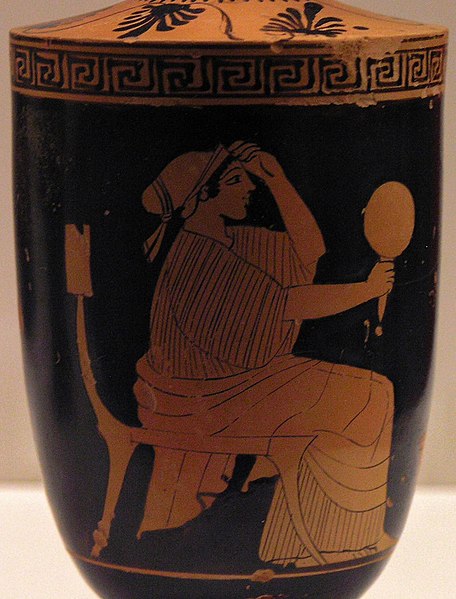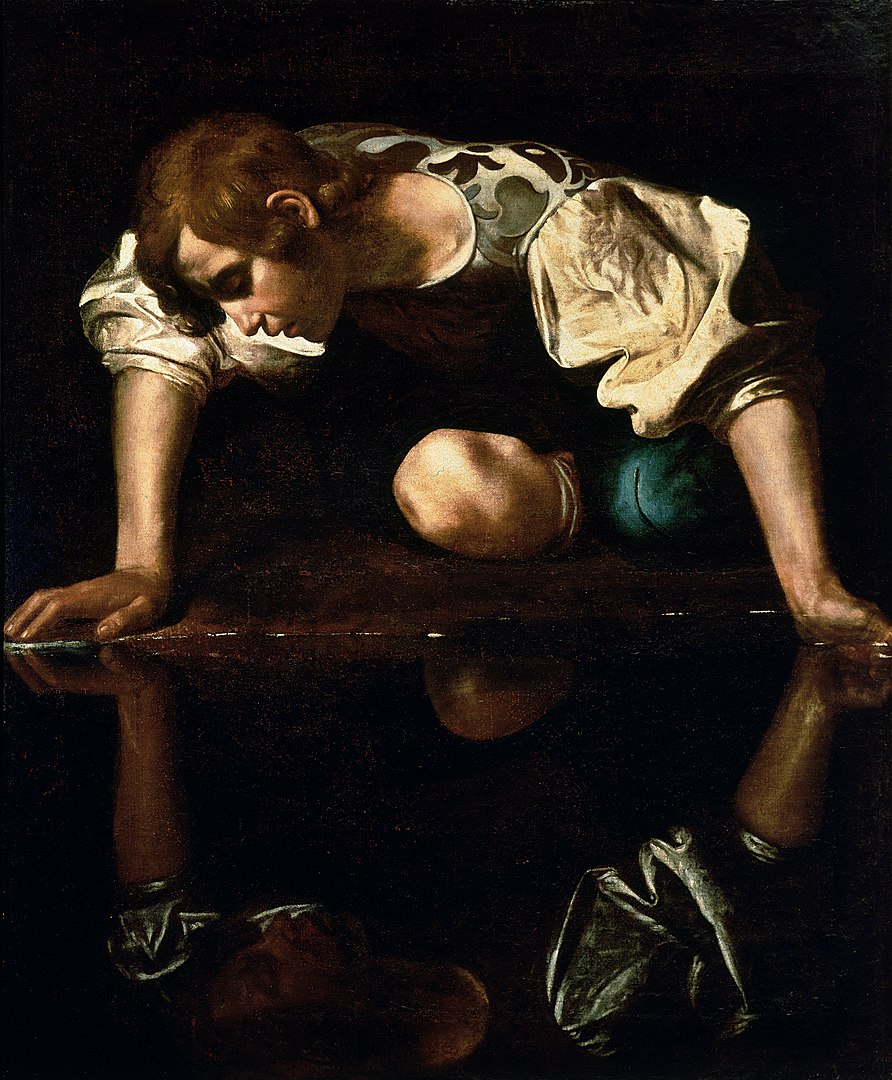لوحات من الفلسفة الوجودية: إضاءة على أبرز مفاهيم ومقولات الوجود | أوس حسن
إن الفلسفة غير معنية بالوضوح أو بتقديم أي إجابات واضحة عن الإنسان والعالم. هناك مقاربات وتيارات فلسفية هي أشبه بلعبة...
Imagine a world without mirrors. A world with no shiny surfaces, a world in which nothing had reflective properties. What would be missing from a world with no mirroring possibility? Can we conceive of a human world in which mirrors do not exist? In this short essay I do not intend to give definitive explanations of our relationship with the mirrors around us, but to explore the complexity of this relation. I would like to have you consider mirrors not as merely, or primarily practical devices for our getting around the everyday, but as tools towards revealing what it is to be human, and what it is to be a particular person. I would like you to think of mirrors as spiritual devices.
I want to argue that the capacity to recognize a reflection, the access to the concept of reflection, and the need to produce reflections have to precede the attempt to produce objects with such properties. It is not by mere chance that we have mirrors; we don’t look into mirrors simply because they happen to be around. The animal world, as a rule, lacks mirrors, and not because there are no shiny surfaces in their world. But rather because animals, with some exceptions, do not recognize their own reflection. They don’t see reflections of themselves because they are not aware of having a self, and are not concerned with questions of identity, of who one is, of who one could be, and with the meaning of their existence. What makes mirrors possible? What grounds the need for mirrors?
Quick speculative histories of mirrors, tell us that the first mirrors were pools of dark, still water.[1] Couldn’t it be rather the case that the human kind first saw its reflection in a pair of eyes? To see another pair of eyes directed towards you, is to see yourself looked at. There are both philosophers, and psychologists who argue that the idea of oneself, the awareness of being someone, originates in the encounter with another person.[2] Getting back to the dark pools of water, what did the first person who first noticed their reflection in water see? They saw an obscure image of a face looking back at them. For the first split second of this encounter, the image has probably not been recognized as one’s own reflection, but just prompted the need of self-examination.
The first manufactured mirrors that we know of, dating back to 2900 BCE, were round objects with handles designed for being held, or for standing, just big enough to reflect the human face. Later, when the technology allowed it, they were manufactured to be big enough to reflect the whole human figure. Historians and anthropologists testify that the personal usage predates their decorative, and architectural use, as well as the practical purpose of reflecting obstructed, and not directly visible objects.

Are mirrors windows towards the most true and otherwise inaccessible aspects of reality, or do they rather only present us with simulacra and illusions? Both the Greek and Latin etymologies for the word “mirror”, record our complex relationship with them, of both fascination and deference, as well as suspicion and caution. The Latin mirare, which the English “mirror” inherits, meant “to look at,” and it was a derivation of mirari, which meant “to wonder at something,” “to admire.”[3] The Latin for the object mirror was speculum, and referred to a “reflector”, or “looking glass”, also meaning “copy,” or “imitation.”[4] Speculum derived from specere – to look at; other derivates of specere are “to inspect”, “to suspect”, as well as “to despise”, and “conspicuous”. In the same etymological family we also find speculari, which means “to spy out”, or “to examine”.[5] Of course, the most obvious derivate of specere is “to speculate.” Speculative is the kind of thinking that advances theories without firm evidence.
Mirrors give us reflections. Human thinking is reflective, as opposed to animal thinking which we could say, very roughly, is instinctive. Reflective thinking frees human beings from nature. In reflective thinking, one examines the content of their own thoughts. Reflection aims at building a self-sufficient world of thought, independent from the empirical world of senses, a world of pure meaning, grounded not on matter, but on the logical relationship between concepts. Philosophers have sometimes argued that such an ideal reflective reality has no need for the material reality to exist. The world of pure reflective thinking captures essential truths that hold across all possible worlds.
Is the reality of the mirrored reflection similar to the reality of reflective thinking? Are mirrored reflections more than mere duplicates of material fragments? Are mirrored reflections more than frozen momentary snippets of the material world and the body? Can we see in mirrors essences that are in the end independent of the material surfaces of our being? Do reflections have the capacity to open up for us the deeper, spiritual world of the self? If reflective thinking can lead us to the core of our rational being, can mirrors show us the core of our spiritual being? Can mirrors show us the essence behind the masks we put on for whatever purposes? Can mirrors show the core of one’s self, the self behind all the identities one arbors for different others? Are mirrors for freeing us of social masks, and delivering us back to our-selves?
Think of walking along a wall of mirrors without realizing it is mirrors you are walking by, and sensing that a figure is following you down that wall. You turn your head and you discover that it was yourself who was accompanying you. It was the presence of your own self experienced as a foreign presence that you felt followed by. Mirrors remind us that we might not be one with our own self, and that our self might be unknown to us. Such events remind us that we are not always equal with our own self, that we might we walking parallel to our self. To look in a mirror is to attempt to look into one’s own eyes as if into the eyes of another, unknown person, with a purely unbiased look. Think of getting an unexpected glimpse of yourself upon turning around and suddenly discovering a mirror where you did not expect one to be, and which for a split second you don’t realize is a mirror. You see someone without realizing is yourself you’re seeing. Who do you see? What is that person, unknown to you, like? What do you think of them? To look for one’s own mirrored reflection is to hope that the self will tell its true story.
It might be the case that the less one tries to build an image for the other, the better are they acquainted with themselves, the more are they at peace and in control of their own self. I am saying this because one has to ground the images that they depict of themselves for others, if they want such images to be successful, in the expectations they think the other has. And the harder we try to meet foreign expectations, the more are we likely to forget ourselves.
Mirrors give us reflections of what is temporarily, or structurally, due to how our bodies are shaped, out of our sight. But is that really what we’re first concerned with when we examine ourselves in mirrors? Or are we rather hoping to get a glimpse of the immaterial core of our self, of what hides behind all flesh and expressions, of what can’t as such appear in any image? To look at oneself without mirrors is more like trying to look at something over one’s shoulder. We look backwards, towards something already there, and of which we can only get a partial view. Looking over one’s shoulder is looking through one’s already formed expectations and ideals about oneself, half projecting what they want to see, half being opened to being surprised, and hoping for confirmation. Only mirrors and foreign pairs of eyes give us the possibility to look ourselves directly in the face, and avoid the circular move. Can mirrors show us what we are not ready to see, or can they only show us the projection of our expectations? Can mirrors show us anything that we did not put in them ourselves?
The human need to look in mirrors is grounded on the noble search for a wider, deeper world than the one we can immediately see and touch. However, as, for example, the myth of Narcissus teaches us, one can drown by becoming fascinated with the surface of their being. One can drown in what one projects of oneself.

Mirrors themselves should not to be blamed for the failure of reflecting a deeper truth, just as they don’t deserve praise for the opposite accomplishment. In the absence of someone’s attention being directed towards them, they are mere powerless objects. They become reflective devices only when assumed by someone who has the capacity of reflection, and therefore, the mirror’s capacity to reflect stretches just as deep as the attitude of the person using them can reach. In the end, the performance of every device is dependent on the virtuosity of the person using it.
In many languages we can find variations of the following phrase “The eyes are the mirror of the soul.” This phrase is probably meant to say that if we want to know someone (else’s) soul, their eyes is what we need to look into. But how can one see their own soul? What are you looking at when you look at your mirrored reflection? Are you looking directly into your own eyes, or are you avoiding your eyes by being concerned, and absorbed with the surface of your face? What do you see when you look into your mirrored eyes? Can you see yourself looking back at yourself? For how long can you hold your own gaze?
[1] https://en.wikipedia.org/wiki/Mirror
[2] The most famous discovery in neuroscience and psychology in support of the idea that awareness of oneself depends the interactions with others is the discovery of mirror neurons. There is also abundant philosophical work that elaborates on this neurological finding. However, before and independently of empirical findings regarding the relevance of the encounter of the other for the constitution of the idea of the self, we have, for example, Edmund Husserl’s work in phenomenology, and particularly on intersubjectivity.
[3] https://www.etymonline.com/word/mirror
إن الفلسفة غير معنية بالوضوح أو بتقديم أي إجابات واضحة عن الإنسان والعالم. هناك مقاربات وتيارات فلسفية هي أشبه بلعبة...
رأى الطيار كينيث أرنولد، في 24 يونيو 1947م، تسعة أجسام هلالية الشكل تحلق بالقرب من جبل رينييه في ولاية...
ترجمة: هاشم الهلال - تحرير ومراجعة: بلقيس الأنصاري هَدَفَ كتاب سوزان ستبينغ الفلسفيّ، إلى إعطاء الجميع أدوات التفكير الحُرّ. "هناك...
يدعونا جون بول سارتر في رائعته «الكينونة والعدم» -التي كُتبت خلال الاحتلال النّازيّ لفرنسا- إلى تخيّل مشهدٍ من الحياة اليوميّة:...
«معنى»، مؤسسة ثقافية تقدّمية ودار نشر تهتم بالفلسفة والمعرفة والفنون، عبر مجموعة متنوعة من المواد المقروءة والمسموعة والمرئية. انطلقت في 20 مارس 2019، بهدف إثراء المحتوى العربي، ورفع ذائقة ووعي المتلقّي المحلي والدولي، عبر الإنتاج الأصيل للمنصة والترجمة ونقل المعارف.